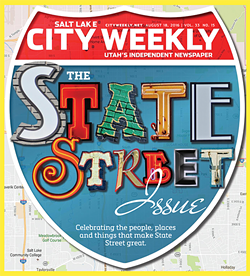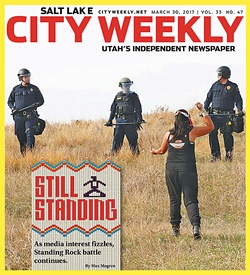"It was a momentous occasion last deadline, when City Weekly publisher John Saltas called a mandatory impromptu meeting," editor Enrique Limón informed readers on July 14, 2016. "The whole staff congregated in the meeting room, Saltas spoke about the paper's storied history and recalled all past editors one by one, leading up to '... and now, Enrique.' Smiles erupted, backs were patted and ouzo flowed like manna."
No stranger to alternative media outlets, Limón considered his CW stewardship as the "ultimate prize," particularly given the company he was now keeping.
"This paper, and most others like it," he wrote, "are put together by a slim staff of some of the most dedicated individuals you'll ever share a war-torn commercial-grade carpeted room with. Folks that have missed anniversaries, birthdays and many other family functions, but never a deadline. People that hold our industry's core values true and will continue to do so from their cold, ink-stained hands. I consider myself lucky to be around them."
We were indeed lucky to have such unique talents writing, producing and distributing CW during its 33rd year. Dylan Woolf Harris and Stephen Dark covered the John Swallow trial, Annie Knox reported on the Legislature and local music was handled by the likes of Randy Harward, Kimball Bennion, Bill Kopp, Brian Staker, Alex Springer and Lee Zimmerman. Carolyn Campbell followed the long-delayed justice brought to the murderer of Carbon County resident Loretta Jones (1946-1970).
Jordan Floyd reported on burro deaths under the Bureau of Land Management, while Colby Frazier's coverage of the Unified Fire Authority led to the resignations of chief Michael Jensen and deputy chief Gaylord Scott after hundreds of thousands of dollars in bonuses and benefits were discovered. And this doesn't even get to our special issue on State Street or Ryan Cunningham's cover story on seagulls!
Apartments were going up, along with the rent, leaving developers sitting pretty but others out in the cold. Homelessness was a particular sticking point, as illustrated in the protracted debate over Rio Grande's homeless population and the planning of shelters scattered around the city.
Questions on police brutality surrounded the shooting of Abdullah "Abdi" Mohamed, the state school board was hiring non-teachers as educators, the anti-vaccination movement was on the upswing and an algal bloom was afflicting Utah Lake. But not to worry, for legislators busied themselves declaring pornography a public health crisis and finangling to undo the Bears Ears National Monument. And lest anyone feared that state officals were out of touch, Utahns had the reassurance of Gov. Gary Herbert openly declaring himself "Available Jones" to those with deep pockets.
These were days when lies were rebranded as "alternative facts," when white supremacists were emboldened and when the 2016 presidential election cleaved ever further into the national psyche. Dark times, but if the demonstrations for refugees and women's health, the rise of Black Lives Matter and Navajo efforts against San Juan County's racial gerrymandering were any indication, there appeared to be plenty of people unwilling to acquiesce to such ruinously ascendant shadows.
Such were the themes that our staff devotedly sought to bring to readers both near and far and under deadline. To do so was hardly ever boring and always demanding, but with this kind of company around, the work remains a prize in itself. "So what do you say?" Limón asked in his editorial. "Let's face this new chapter together and ruffle some feathers along the way."
Remembering Vol. 33: In the voter booth
With the accession of Donald Trump to the U.S. presidency, great consternation was felt inside and outside of the country. Bert Johnson, interviewing locals in Mexico City for an Aug. 10 cover story, frequently encountered comparisons between Trump and other dictators. "Some likened [Trump's] campaign to a stunt, instead of a serious attempt to win the White House," Johnson noted. "Lots of people described his campaign as a joke—but not a funny one."
Trump's rhetoric against immigrants and climate change, his treatment of women and the poor, and his penchant for inciting violence were causes of concern and only compounded with his entry to power. Jan Chamberlin resigned from the Mormon Tabernacle Choir when the choir accepted an invitation to sing at Trump's inauguration, rubber bullets and chemical spray were unleashed on protesters in Washington D.C., and even here in Salt Lake City, there was a demonstration of hundreds to register disapproval of the new administration.
"It feels a little too late, but it's what we need to do now," protestor Rebecca Barker told Dylan Woolf Harris for the Jan. 26 issue. "We just want to show that the people have the power still. We want to be heard."
For John Saltas, the election brought back memories of the first time he had cast a vote in 1972, behind the patriotic drapes of a booth at the Copperton Lions Club. Shortly after departing, his ballot still waiting to be counted, Saltas recalled hearing the radio announcement that Richard Nixon had won re-election, defeating George McGovern in what Saltas and subsequent political historians considered a "massacre."
"Every cause I believed in was shredded," Saltas wrote. "I didn't matter. My friends didn't matter." Not only did he feel like his vote didn't count, but it seemed the world was coming to an end. "But it wasn't," he added.
"Today, many people fear for their very being," Saltas continued. "But, here's the deal: If you give up, it's game over. If you remain afraid, it's game over. If you don't do something positive, it's game over. We need to know we're not alone—but protests alone won't move the needle. Especially pointless is raging that all of the 60 million people who voted for Donald Trump are a bunch of inbred, toothless, dimwitted, racist, gun-toting idiots. Some are, but not all."
Saltas reminded his readers that many Trump voters had more in common with them than said voters had with their candidate, and that the election could very well have been more of a Kafkaesque example of Hillary Clinton losing than Trump winning.
Operations like City Weekly had been obliged to increase security because of the hostile rhetoric that Trump normalized against the press, but such an atmosphere shored up a needed sense of resolve. "We will not let our love of the First Amendment be taken from us, we cannot abrogate our responsibility to solace the weak and to strengthen the bold," Saltas concluded. "We have learned to trust more in words, truth, honor and action—and less in people. It's the best we can do. If we fail, it won't be because Trump did it to us. It will be because everyday people took us for granted and never learned how and why we got here."
In the water
"Before the U.S. Army Corps of Engineers rejected an easement that would allow the proposed Dakota Access Pipeline (DAPL) to cross under [North and South Dakota's] Lake Oahe, I was at Standing Rock alongside the water protectors," reported Lori Wagner on Dec. 22. "Standing Rock defies classification. There were, as far as I can estimate, 10,000 people from 70 tribal nations in the largest native gathering in history, all with a common goal of peacefully, soberly and prayerfully, protecting the Earth and, especially, the first medicine—water."
Since the spring of 2016—when four states finalized the DAPL project without adequate environmental reviews—Native Americans from the Standing Rock Sioux Tribe had been petitioning against the 1,100-mile-long pipeline's defiling of their water supply and sacred burial grounds. They set up camps in opposition and, by the fall, had been joined by tribes and allies from around the country. The gathering was met with a militarized police response, as captured on film by students from Salt Lake Community College.
Wagner's December account described a landscape of teepees and tents, of pre-breakfast prayer circles, bareback horse riding, hip-hop concerts, circling helicopters and the distribution of incoming food and clothes. "One elder says he had a vision that the Black Snake from Sioux prophecy, which is believed to be the pipeline, can only be defeated by prayer," Wagner recorded. "He states that all people are one. We love each other. We must pray and be peaceful. Tears are running down the faces of many, even mine; not just this time but many times around the fire as message after message of love and support are delivered."
After a prolonged standstill, the departing Obama administration halted completion of DAPL, and the Army Corps agreed to explore diverting options for the pipeline. "The situation at Standing Rock is not just about a pipeline," Wagner concluded her account, "it's about regaining our lost connections with community and nature, and forging an honest, modern society."
DAPL was advanced once more by Donald Trump and completed in the spring of 2017. It continues to operate despite an ongoing environmental impact study, slated for completion in late 2024.
More by Wes Long
-
40 Years of City Weekly—Volume 36: 2019 to 2020
City Weekly Rewind
- Apr 24, 2024
-
40 Years of City Weekly—Volume 35: 2018 to 2019
City Weekly Rewind
- Apr 17, 2024
-
Salt Lake's modern tree canopy is a living legacy of the peoples of Utah.
Life in the Slow Lane
- Apr 17, 2024
- More »








